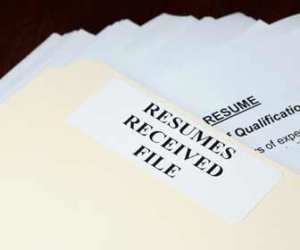14 Things To Look For When You Screen A Resume
Do you have a towering stack of resumes on your desk or sitting in your email inbox? It’s your job to read and analyze all of those resumes in an attempt to pick your next employee. How do you sort through those resumes to choose the best employees to invite to the interview round? It can certainly be daunting task – unless you know how to screen a resume quickly and efficiently.
Reading resumes and selecting the best candidate isn’t an exact science. In a perfect world, you would sit down and review ever single resume for 4 or 5 minutes. This gives you time to read every word, consult a candidate’s web presence, and make a well-informed decisions on that candidate’s ability to do the job. But how long do you really spend reviewing a resume?
If you’re like the majority of recruiters, you probably spend less than 10 seconds reviewing a resume. According to a report from TheLadders.com, most recruiters only spend 6 seconds reviewing a resume before they make an opinion on a candidate. That’s not very much time at all.
Whether you spend six seconds or a minute, here are the things you need to pay attention to when you screen a resume to select the best candidate:
- Contact Details – Contact info is vital for communication with a job candidate. They need a name, address, phone number, and professional email address.
- Web Presence – A link or website address is a huge addition to any resume as it shows that the candidate can show you more than just a simple resume file.
- Location – For most jobs it’s necessary for a candidate to be in the same location as the business. If this is a factor in your recruiting process, eliminate anyone not in the general vicinity.
- Objective Statement – A candidate doesn’t have to have an objective statement. If they do, does their objective match the job description?
- Grammar & Spelling – One single grammar or spelling mistake is means to dismiss a candidate. It shows that they didn’t proofread. Mistakes matter.
- Experience – Experience is necessary for any job. Ideally it is directly related to the job listing. If not, see if it is relevant or transferable.
- Education – People often change paths after they graduate from university. Check a candidate’s education to see if the candidate meets the basic requirements of the job listing.
- Company Recognitions – Any awards or recognitions show that a candidate is capable of doing something exceptional. This is a huge bonus.
- Relevant Skills – Check to see if the candidate has the necessary skills to do the job.
- Readability – Resumes need to be simple, readable, and scannable. If a candidate decides to use fancy fonts or has information scattered across the page, it’s hard to read and may not be worth the time to review.
- Consistency – Does the information on the resume make sense? Do the dates work? Is the information the same on the resume as is it is on LinkedIn? If it’s not consistent or doesn’t make sense, ditch it.
- Quantifiable Facts – Every job seeker needs to show that they have accomplished something at a job. It could be as simple as “Made $5000 in sales every month” or “Grew company website hits from 200 to 100,000.” Information like this shows that the candidate is capable of accomplishing something.
- Tells A Story – A good resume helps to paint a picture of the candidates interest, history, and experience. It keeps you intrigued and wanting to learn more.
- Red Flags – Watch out if you see any of these things on a resume:
- Job Hopping
- Employment Gaps
- Decreasing Responsibilities At Jobs
- Short Term Employment
- Essay Length Paragraphs
- Lack Of Information
- Multiple Pages of Information
- First Person Narratives
- Exaggerated Titles/Jobs/Responsibilities
- Ridiculous Email Addresses
Ultimately a resume needs to help you determine if a candidate can do the job and if the candidate understands the job they are applying for. If you feel that a candidate can do these things after you screen a resume, then invite them to a job interview.
In reality, sifting and sorting through resumes can be done quickly and efficiently if you know what to look for. Most likely you will spend less than a minute deciding if a resume is interview material or will end up in the trash pile. You have to trust your gut sometimes, but if you look for the most important information first, you’ll most likely make the right decisions for your company. Good luck.


